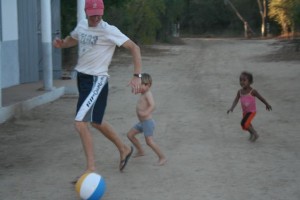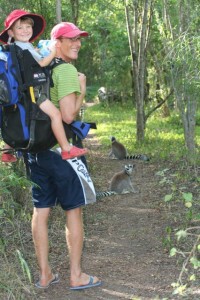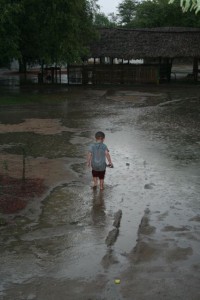…the final installment of Jason’s Alberts essay.
A discussion I began to have frequently with my wife in Madagascar revolved around the premise of students becoming teachers and teachers becoming students. My middle school teaching career was interrupted to facilitate the Madagascar adventure. We explored the paradox of teachers and students: the notion of learning as an accumulation of discrete facts and skills by the young. Clear to me then- as my perceptions of Madagascar formed by observing my son- was the idea that good teaching involved discarding our hierarchy and allowing kids to know we too have things to learn. I regret now having ever said things to my son illustrating a harmful aspect of hubris; of assuming one’s role is teacher.
Our Madagascar life possessed a tidal-like ebb and flow- no obligations beyond exploring and maintaining good health- we all could recognize a sameness in our days; when later, all the small moments would reveal themselves as precious. One such moment splashed in the face of the region’s drought. On a dark cloudy day, however, the skies unleashed. Governmental dignitaries were visiting the research site for a self-congratulatory policy statement the legacy of which I am sure the locals soon forgot. With little shelter beyond a small and protected porch, the adults huddled together like we would suffer the same fate as the Wicked Witch of the West. The water droplets were frigid and stung when they hit as if they had fallen from near space. Rain pounded the tin roof. The dirt flats facing the porch morphed into a mud sea.
Not unhinged by the deluge, my son stripped down. He ran full speed ahead then turned to repeat. This was unfiltered joy. The kind we adults so often cannot access. I know now such displays for a love of life can make people uncomfortable. In our quotidian lives we devolve. We crave the predictable and fear the unknown. I think this mud running frenzy may persist as one of my most proud parenting moments.
~~
Several months before we planned to depart Madagascar, we had heard of an oversized white chameleon frequenting a remote section of forests. On one of our daily hikes, my son in the backpack, we happened upon a treasure. I had lost a camera lens in the area a few days prior and returned to find it. I stumbled on a vine as I stepped off trail. I began shuffling through some fallen leaves. I realized I was in the wrong spot; I had turned off trail too early. My son then outstretched his arm and pointed his finger. “Snake!”, he declared. A yard in front of us, an eight-foot Madagascar Ground Boa had the Moby Dick of Chameleons firm in its jaws. With the snake pre-occupied I lifted my son from the backpack and set him on the ground. We watched. Unhurried and fastidious jaw movements shifted the chameleon further down the snake’s throat. My son and I did not speak. An hour or two had passed before the snake ceased its repetitious movements. Both animals lay still. The chameleon’s head ingested, its body sticking out from the Boa’s now slack-jawed mouth.
The monsoon season was not far off. We heard thunderheads rolling in form the Indian Ocean. Leaves curled as if in anticipation of a hard earned rain. I placed my son in the backpack, left a marker on the trail, and hurried to get my wife. My family returned to the marker as the sinking sun left a darkened forest. Dry leaf detritus crunched under our feet. Lying still on the ground, the white chameleon looked ashen. My son picked up a stick and prodded the chameleon. The thick body rolled on its side. And by now the snake had disappeared still hungry. We looked around nervously expecting the boa to drop from a limb. I most vividly recall telling my son the chameleon was dead. And this meant it could not move anymore. That being dead was something altogether different than sleeping; there would be no waking up. A few questions came making me realize my son struggled appropriately with the concept and how anything in the world could simply just end.
In the ensuing years, when my son has asked if something is dead or not, I usually reference the white chameleon. “Dead like the white chameleon, remember that?” I say. This is now a part of our language; our syntax to help define what a father and son may discover. I can only hope the effects of our trip and the memories do not fade. I like to think it has, and will shape who he is. Frequently, however, we reflect and rediscover through our digital images, our distant life on the big, red island.
I now have a better understanding of the transitory nature of wisdom: that children, often times, harness a more measured and deliberate approach in exploring the new. They teach us to understand in their terms. The real education of parents- and all adults for that matter- unfolds during a lifetime; most often we are forgetful of the nuances that make it relevant.
The paradox of teacher and student often goes unexamined; and remains perhaps a misuse of terms. The relationship is in the education, the process of experiencing. I too have said things to my son illustrating this most harmful aspect of hubris, of the assumption that I am teacher. I know of no other way to describe how I ultimately accepted the lessons I need to learn as we towed our child to the apogee of our tent-bound lives.
Jason Albert lives in Bend, OR with his family.



“the idea that good teaching involved discarding our hierarchy and allowing kids to know we too have things to learn” — awesome. love the exploration of “the paradox of teacher and student” — important insight. and the mud-running thing, and your reflections about adults and children, were great. incredible scene with the boa and chameleon, and so many other things. what an experience! thanks for sharing.
Finally getting a chance to comment on the series. What a great experience on so many levels. That time will be so precious to you and your son, even is he doesn’t remember everything that you do. How much better off will he be than if he’d sat in front of a TV watching Baby Einstein or something. Thanks for sharing your family’s adventure.
I really enjoyed this series. I’ve learned a lot, camping with my kids – their innocence and curiosity is infectious!
Yeah, we thought it was a really intriguing perspective. Definitely a pretty cool experience.